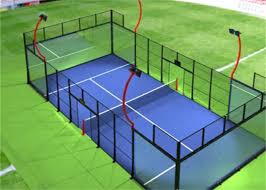

Building a padel court has become an increasingly popular investment for recreational facilities, sports clubs, and individual enthusiasts eager to embrace this vibrant sport. As with any construction project, understanding the costs involved is essential. In this article, we will explore the various factors that influence the price of building a padel court, providing a comprehensive overview for anyone considering this exciting venture.
Understanding Padel Courts
Padel is a racquet sport that combines elements of tennis and squash. It is typically played in doubles and is enjoyed by people of all ages. One of the primary attractions of padel is the relatively small size of the court, which is 20 meters long and 10 meters wide. The courts are enclosed with walls, allowing players to use them in their gameplay.
Factors Influencing the Cost
1. Materials The cost of materials has a significant impact on the overall budget. A standard padel court is usually constructed from glass and metal, with a playing surface made from artificial turf. The quality of materials can vary widely, influencing not just the initial outlay but also the maintenance costs over time. High-quality glass is essential for visibility and aesthetics, while the turf needs to be durable and withstand various weather conditions.
2. Construction Type There are different approaches to constructing a padel court. Some facilities opt for permanent structures, while others may consider modular or temporary courts. Permanent courts are generally more costly due to the labor and specialized equipment required for installation. In contrast, modular courts can offer a more budget-friendly alternative but may lack the longevity of their permanent counterparts.
3. Location The location of the court can also significantly affect the price. Building in urban areas may come with higher land costs and zoning regulations, whereas rural areas might offer more affordable land but possibly less foot traffic. Additionally, proximity to other sports facilities can impact potential usage and revenue generation.

4. Labor Costs Labor is another critical component of the overall expense. The rates for professional contractors can vary based on geographic location and the complexity of the project. Hiring experienced builders who specialize in sports facilities may incur higher initial costs but could save on future repairs and maintenance issues.
5. Additional Features Many padel court owners opt for additional features that enhance the player experience. This could include upgraded lighting systems for evening play, heating for colder climates, or spectator seating. Each of these elements adds to the overall cost but can also enhance the court's attractiveness and utility.
Average Cost Estimates
On average, the cost to build a standard padel court ranges between $25,000 and $60,000. However, this price can vary significantly depending on the factors mentioned above. For those looking to build multiple courts or a full-blown facility with multiple amenities, costs can easily escalate beyond the initial estimate.
Conclusion
Investing in a padel court can be a rewarding venture, providing enjoyment for players and potentially generating revenue for facilities. However, it is crucial to conduct thorough research and consider all variables affecting the total cost. Understanding the factors that contribute to the pricing will help prospective builders make informed decisions, ensuring their investment is sound. Whether for personal enjoyment or commercial gain, a well-constructed padel court can be a fantastic addition to any sporting environment, facilitating fitness, fun, and community engagement.
With the popularity of padel continuing to rise, now may be the ideal time to explore this exciting opportunity.
Durable Industrial Flooring Solutions for Factories & Padel Courts Custom
PVC Sports Flooring Durable, Shock-Absorbent & Safe
Premium Homogeneous Transparent Floor Durable, Slip-Resistant Rubber
Premium Rubber Composite Flooring Slip-Resistant & Durable
Premium Rubber Flooring Durable & Slip-Resistant Safety
Premium Rubber Brick Flooring - Durable, Eco & Slip-Resistant